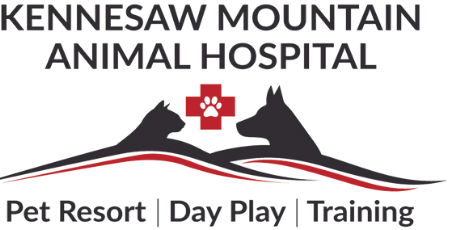
Pet Nutrition & Weight Management

Pet Nutrition & Weight Management
Understanding Pet Nutrition
Pet nutrition is commonly the source of obesity, allergies, and other internal issues with pets. The veterinary team at Kennesaw Mountain Animal Hospital has extensively researched pet nutrition and is eager to share their knowledge to ensure your pet lives a quality life through proper nutrition.
Are you feeding your pet the right food?
Have you ever taken an inventory of the foods you consume as a human, only to find that you’re overdoing it on carbs, proteins, or fat? With all the misleading marketing in the pet food industry, getting your information from a reliable source is essential. All pets are different, and what’s suitable for one is not necessarily good for the other. You need the guidance of those in the know…not a company’s marketing message. Our team of doctors can translate what your pet’s food label means to your pet and what steps need to be taken to ensure they’re receiving the proper nutrition for a long, happy life.
The importance of your pet’s nutritional needs.
The marketing of “healthy” pet food is just what it is…marketing. For example: With all the hype about grain-free and boutique foods, the ingredients used to substitute grains, while they sound healthy (such as lentils, peas, legumes, potatoes, etc.), contain low levels of taurine. On July 19, 2018, the U.S. FDA issued an alert regarding grain-free diets and a possible link to dilated cardiomyopathy (a decreased ability to pump blood), often resulting in congestive heart failure. The correlation of peas, lentils, chickpeas, beans, and potatoes is the focus of the investigation, and if your pet is currently on a grain-free diet, the FDA urges pet owners to consult their veterinarian. Certainly, valuable information to know, but you won’t hear/see that in the marketing of grain-free products.
“Oh, it’s just a couple of pounds.”
Here’s a little perspective for you to consider: Each excess pound on a cat is equal to 15 pounds on certain humans; two extra pounds on a dog is equal to 10 pounds on certain humans; a 90-pound female Labrador retriever is equal to a 186 lb. 5’ 4” female, or 217 lb. 5’ 9” male. We all know what this does to our overall health.
As your pet gains weight, they slow down, are unable to jump up on a favorite couch, no longer want to go for walks, etc. Then the internal symptoms begin to present themselves, albeit the internal damage has been happening for a while…you’re just now being made aware of it. Now you’re going to the vet more often for issues such as diabetes, heart disease, hypertension, arthritis, etc. Not to mention the medications they will have to be on for the rest of their lives because someone said, “Oh, it’s just a couple of pounds.” You are the sole voice for your pet’s health; let Kennesaw Mountain Animal Hospital provide the guidance you need to extend your pet’s life comfortably, happy, and healthy.
Ongoing Maintenance
As your pet ages, his or her nutritional and weight control needs will inevitably change. For us to continue achieving the desired results, we must ensure that our approach also evolves. At certain life stages, such as the transition from youth into adulthood, we’ll evaluate our plan and make any necessary adjustments. This will improve the chances of your companion staying in tip-top shape throughout his or her life.
Give the team at Kennesaw Mountain Animal Hospital a call today to get started. We can design a customized diet and exercise plan to bring out the best in your animal friend.

